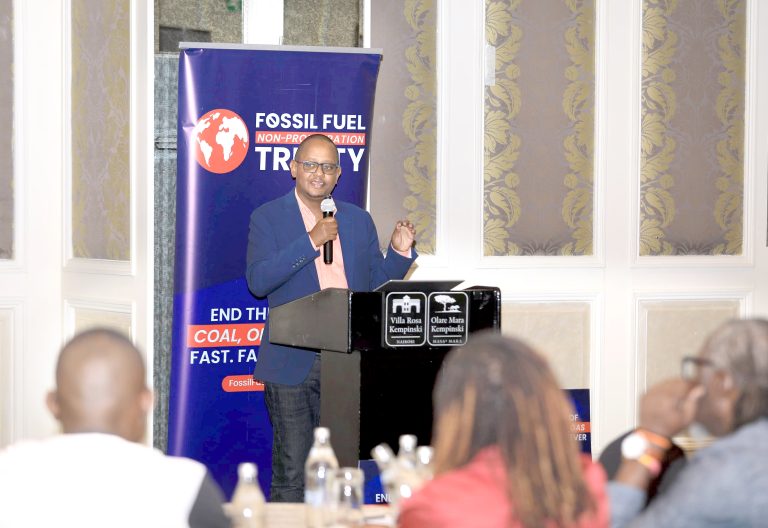Players urge State to back a global fossil fuel reduction treaty
By Clifford Akumu, June 5, 2025Stakeholders in climate change have urged Kenya to join global efforts in calling for a fossil fuel treaty to tackle the triple planetary crises of climate change, biodiversity loss and pollution.
Speaking in Nairobi on June 4, 2025, ahead of the World Environment Day celebrations, they urged the government to join the bloc of 16 nations participating in discussions for a fossil fuel treaty, to help shape the terms of an international mechanism that prioritises the needs of the most climate-vulnerable nations.
The stakeholders were drawn from diverse backgrounds, including civil society, interfaith, youth and indigenous community leaders.
The group emphasised the critical role that Kenya, as a regional climate leader, can play.
The proposal for a fossil fuel treaty is anchored in three pillars, including a global transition away from fossil fuel, non-proliferation or an end to expansion of new coal, oil and gas projects everywhere and a fair phase-out that will require wealthy nations to phase out existing fossil fuel production.
As the world grapples with escalating climate impacts, driven primarily by the extraction and use of oil, coal and gas, the countries and communities that have contributed the least to the crisis bear the brunt of its impact, necessitating the proposed legally-binding mechanism aimed at a fair and financed transition to renewable energy.
Fossils failure
“In spite of these unjust circumstances, countries such as Kenya are leading the shift to renewable energy. With the right international mechanisms in place, much more can be achieved to support these efforts and the global transition”, said Frederik Njehu, global political lead, fair share at Greenpeace Africa, arguing that it’s time for a global plan to supplement the Paris Agreement by tackling the root cause of the crisis and charting the path for a fast, fair and financed transition.
Fossil fuels have failed to power Africa, leaving 600 million people without energy and driving a health crisis with 950 million people inhaling toxic fumes daily.
Njehu insisted that Kenya needs to put more resources into ensuring people have access to clean energy.
He categorically rooted for innovative sources of funding to power the country’s goal of achieving 100 per cent renewable energy access in Kenya by 2035.
“We need our African nations at the table shaping this solution, a fossil fuel treaty that will deliver a much-needed transition to a liveable and prosperous future fuelled by renewable energy,” he added.
Fossil fuels are the major cause of adverse weather conditions. Communities relying on land and animals to survive suffer losses from drought due to unpredictable weather conditions.
“We support the call for a fossil fuel treaty because we want to protect our land for future generations and stop the damage caused by pollution. We urge other communities and our leaders to stand with us and join this global effort,” noted Moses Ole Kipaliash, a Maasai community leader and environmentalist.
The Maasai community are the first indigenous people in Africa to back the call of the treaty, joining 11 Amazonian indigenous nations.
Divine duty
Hakeem Khalid, the environment and climate change lead, Supreme Council of Kenya Muslims(Supkem) and the Inter-Religious Council of Kenya (IRCK) say that protecting the environment and all creation is a moral imperative and fulfilling this responsibility requires international cooperation.
“It is for this reason that we, the interfaith communities, stand with other stakeholders in support of the call for a fossil fuel treaty, which offers a critical pathway for protecting nature by facilitating a fair and financed transition that supports the shift to a safe, clean, renewable-powered future for all,” noted Khalid.
The youth are disproportionately impacted by the climate crisis. But, Muthoni Kariuki, president of Green Age Warriors and Miss Tourism Africa 2022, highlighted that empowering the youth is key in fighting climate change issues since “the continent boasts of a huge youth population that is driven by technology”
With its track record of climate leadership, including the bold target of 100 per cent renewable energy, Kenya is uniquely positioned to lead the continent in championing transformative climate solutions.
“Supporting the call for a fossil fuel treaty would not only cement Kenya’s leadership but also align with its national ambitions. The treaty unlocks international finance and technology transfer that would bolster renewable energy goals,” said Prince Papa, Africa campaigner, Fossil Fuel Non-Proliferation Treaty Initiative, adding that it is important for Kenya to back the call for a Treaty and join the 16 nations participating in discussions for a fossil fuel treaty.
